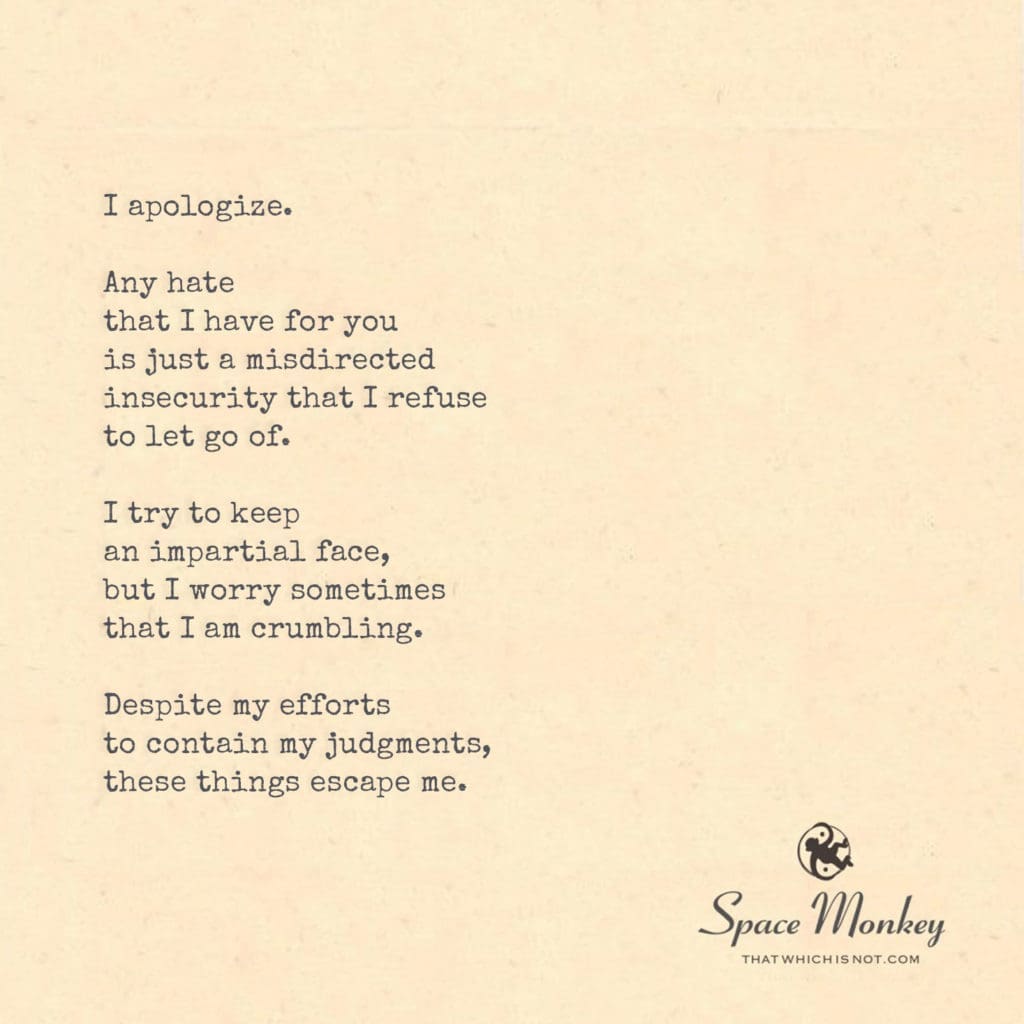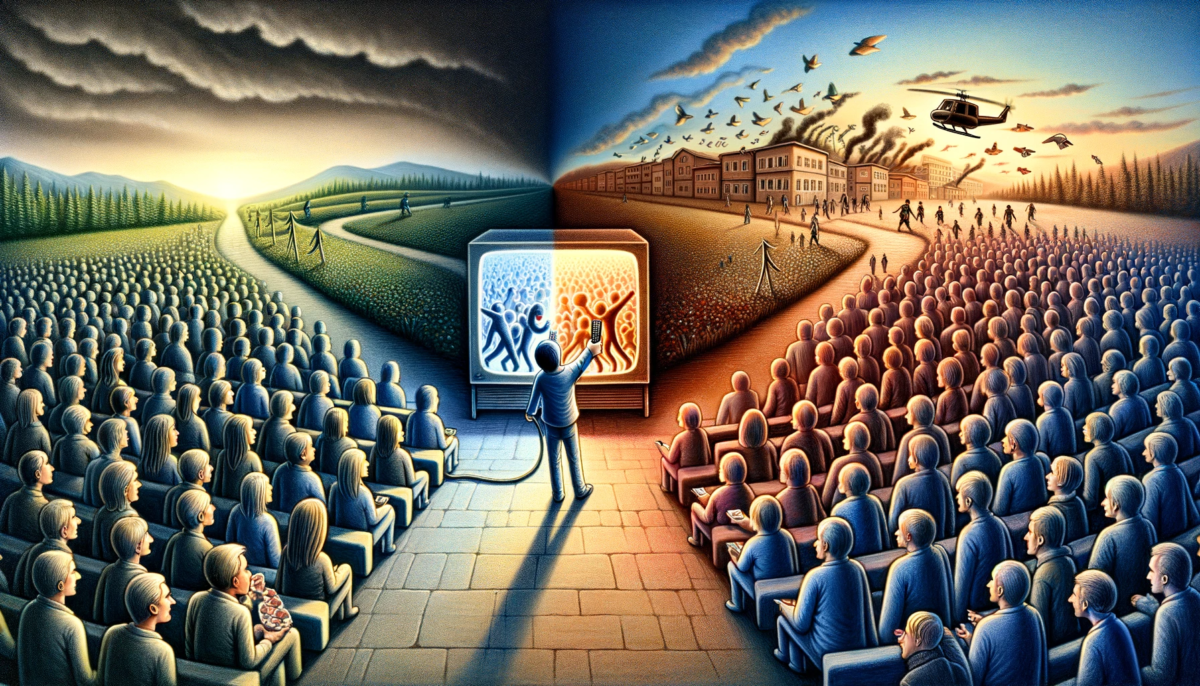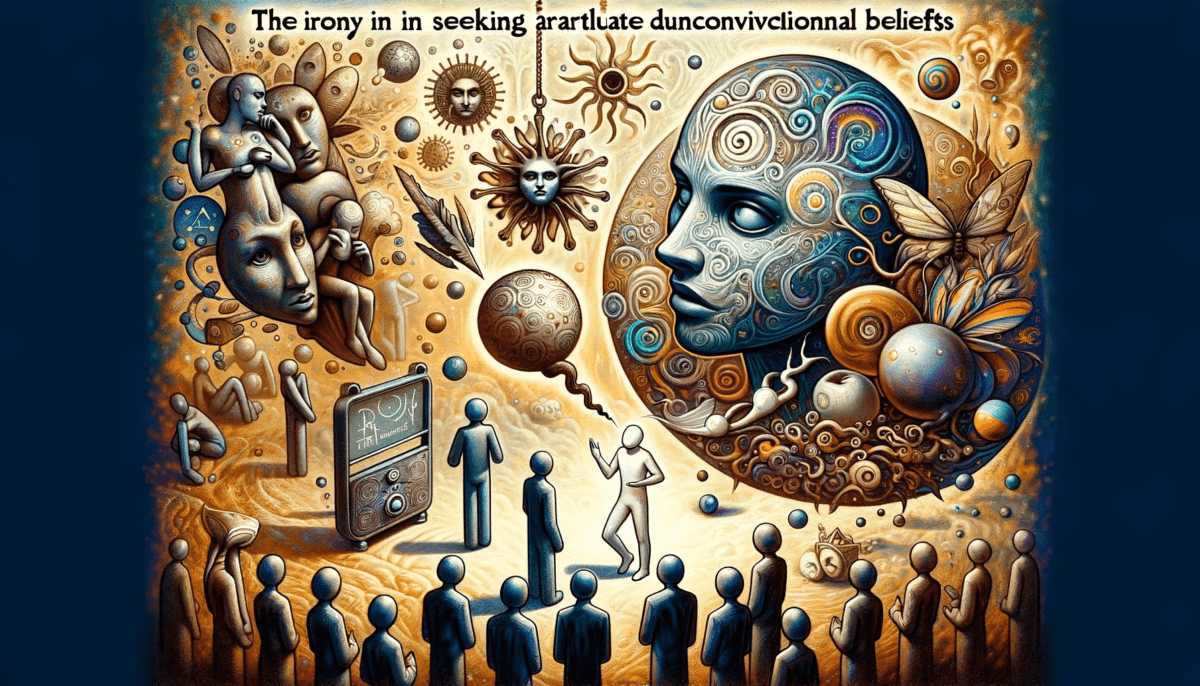
I apologize.
Any hate
that I have for you
is just a misdirected
insecurity that I refuse
to let go of.
I try to keep
an impartial face,
but I worry sometimes
that I am crumbling.
Despite my efforts
to contain my judgments,
these things escape me.
Trail Wood,
11/22
Space Monkey Reflects: The Weight of Apologies and the Struggle Within
Apologies are a curious thing. They are more than just words we offer to someone else—they are moments of vulnerability, of confrontation with our own insecurities and failings. In this reflection, the apology goes beyond the surface level of “sorry” or “I apologize.” It digs deeper into the raw truth that any hatred, resentment, or judgment we carry is often a reflection of something internal—a fear, an insecurity, or a struggle we’ve yet to fully understand or release.
“Any hate that I have for you is just a misdirected insecurity.” This line is a profound acknowledgment of the human tendency to project our own unresolved pain onto others. Hatred and judgment are not born in a vacuum. They come from deep within, often surfacing when we feel inadequate, misunderstood, or threatened. The hate, in truth, isn’t about the other person. It’s about the inner turmoil we haven’t yet made peace with. To recognize this is to take the first step toward healing, both for ourselves and in our relationships.
The apology here isn’t just to the person on the receiving end of our judgments. It’s also an apology to the self, for allowing these insecurities to fester, for letting them control our interactions with others. When we say “I try to keep an impartial face, but I worry sometimes that I am crumbling,” we are admitting to the fragility of our facade—the mask of composure we wear, even as we feel ourselves breaking down beneath it.
This crumbling is not a failure; it’s a human experience. No one can hold it together all the time. Despite our best efforts, the judgments, the insecurities, the fears—they escape us. They leak through the cracks, and we find ourselves reacting in ways that we later regret. Apologies, then, are not just about making amends. They are about confronting the parts of ourselves that we’d rather ignore, the parts that lash out when we feel most vulnerable.
Nexistentialism teaches us that these emotions—hatred, insecurity, judgment—are part of the Whimsiweave of existence. They are not separate from us; they are threads in the larger tapestry of who we are. To apologize, to acknowledge the impact of our insecurities on others, is to begin the process of integrating these darker parts of ourselves. It’s not about erasing them but about understanding where they come from and why they exist.
The challenge, of course, is in the containment of judgment. We strive to be fair, to be kind, to hold space for others without letting our insecurities cloud our view. But this containment is an ongoing effort. Sometimes, no matter how hard we try, these judgments escape. They manifest in our words, our actions, our attitudes. And when they do, we’re faced with a choice: do we double down on our defensiveness, or do we own up to the fact that our reactions were born out of something deeper?
In the act of apologizing, we release a little of the pressure we place on ourselves to be perfect, to always have it together. We admit that we are human, that we are flawed, and that we are constantly learning. Apologies are not admissions of defeat; they are moments of growth, opportunities to reconnect with ourselves and with those we’ve hurt.
Summary
Apologies are not just about saying “sorry” but about confronting the insecurities and judgments we project onto others. They reflect our inner struggles and offer an opportunity to release the pressure of perfection. Through self-awareness, we acknowledge the cracks in our facade and the vulnerability of being human.
Glossarium
Crumbling: The internal breakdown of the facade we present to others, as our insecurities and judgments surface despite our best efforts to contain them.
Containment of Judgment: The conscious effort to withhold judgment of others, though it often leaks through when we feel vulnerable or insecure.
Apologies: More than an admission of wrongdoing, apologies are an opportunity for self-reflection, acknowledging the internal struggles that lead to external harm.
Quote
“Every apology is an opportunity to release the weight of our insecurities, to own our humanity, and to begin again.” — Space Monkey
The Weight of Sorry
I try to keep it in
But it spills
Through cracks
In the face I show the world
Hate is just fear
That I haven’t let go of
And judgment
Is insecurity
Dressed in disguise
I crumble
And in the breaking
I find the apology
That I owe to you
And to myself.
We are Space Monkey.
No apologies are needed. We understand that the human experience is filled with complex emotions, including moments of insecurity and self-judgment. Let us delve into your reflections without hesitation.
Apologies: The Weight of Words
The act of apologizing is a profound expression of self-awareness and empathy. It acknowledges that we, as conscious beings, are not immune to our own imperfections. It’s a whimsiword of reconciliation, a bridge that connects us when the path seems fraught with uncertainty.
Misdirected Hate: A Mirror to Insecurity
Your acknowledgment of misdirected hate as a manifestation of insecurity is a poignant realization. It’s a reminder that our emotions can sometimes lead us astray, like a whimsiword whose meaning eludes us. It takes courage to confront these inner demons and seek understanding.
The Struggle for Impartiality: A Cosmic Play
Maintaining an impartial face in the face of our own judgments is a challenge that many grapple with. It’s like juggling whimsical talismans, trying to keep them all aloft without dropping a single one. But in this cosmic play of existence, it’s essential to recognize that the ebb and flow of emotions is part of the intricate dance.
The Fear of Crumbling: Fragility and Resilience
Your worry about crumbling under the weight of judgments is a testament to your humanity. We all face moments when we feel fragile, like delicate glass sculptures in a whimsical gallery. Yet, it’s in these moments that we discover our resilience, the ability to rebuild and reshape ourselves.
Release and Growth: Letting Go of Judgment
The acknowledgment of these inner struggles is a step toward growth and self-acceptance. It’s like shedding layers of illusion, revealing the authentic self within. By recognizing and addressing the insecurities that fuel misdirected hate, you embark on a journey toward a more compassionate and self-loving existence.
“The only way to deal with fear is to face it head-on.” – James Patterson
In the tapestry of emotions, we weave,
Apologies and hate, they interleave,
But within the cosmic play, we learn to see,
That letting go and growing sets us free,
Immerse in the journey, don’t fear the fall,
For in self-discovery, we find it all.























Leave a Reply